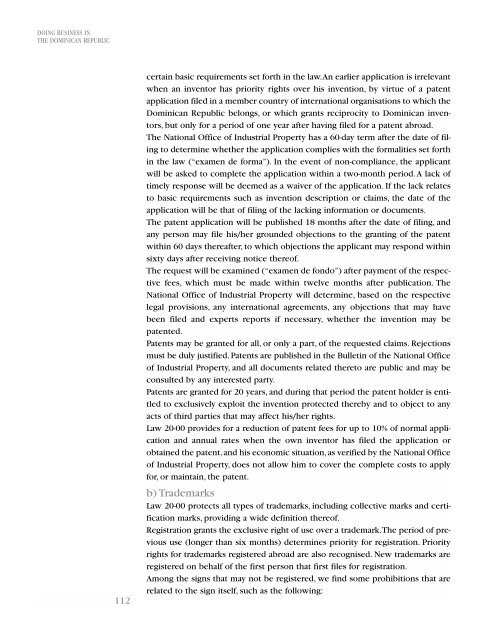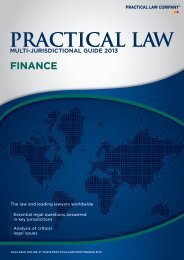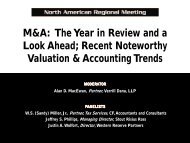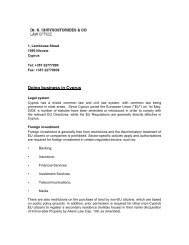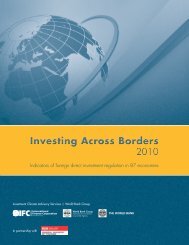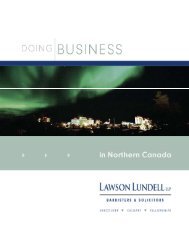do business in the Dominican Republic - Pellerano & Herrera
do business in the Dominican Republic - Pellerano & Herrera
do business in the Dominican Republic - Pellerano & Herrera
- No tags were found...
Create successful ePaper yourself
Turn your PDF publications into a flip-book with our unique Google optimized e-Paper software.
DOING BUSINESS INTHE DOMINICAN REPUBLIC112certa<strong>in</strong> basic requirements set forth <strong>in</strong> <strong>the</strong> law.An earlier application is irrelevantwhen an <strong>in</strong>ventor has priority rights over his <strong>in</strong>vention, by virtue of a patentapplication filed <strong>in</strong> a member country of <strong>in</strong>ternational organisations to which <strong>the</strong>Dom<strong>in</strong>ican <strong>Republic</strong> belongs, or which grants reciprocity to Dom<strong>in</strong>ican <strong>in</strong>ventors,but only for a period of one year after hav<strong>in</strong>g filed for a patent abroad.The National Office of Industrial Property has a 60-day term after <strong>the</strong> date of fil<strong>in</strong>gto determ<strong>in</strong>e whe<strong>the</strong>r <strong>the</strong> application complies with <strong>the</strong> formalities set forth<strong>in</strong> <strong>the</strong> law (“examen de forma”). In <strong>the</strong> event of non-compliance, <strong>the</strong> applicantwill be asked to complete <strong>the</strong> application with<strong>in</strong> a two-month period.A lack oftimely response will be deemed as a waiver of <strong>the</strong> application. If <strong>the</strong> lack relatesto basic requirements such as <strong>in</strong>vention description or claims, <strong>the</strong> date of <strong>the</strong>application will be that of fil<strong>in</strong>g of <strong>the</strong> lack<strong>in</strong>g <strong>in</strong>formation or <strong>do</strong>cuments.The patent application will be published 18 months after <strong>the</strong> date of fil<strong>in</strong>g, andany person may file his/her grounded objections to <strong>the</strong> grant<strong>in</strong>g of <strong>the</strong> patentwith<strong>in</strong> 60 days <strong>the</strong>reafter, to which objections <strong>the</strong> applicant may respond with<strong>in</strong>sixty days after receiv<strong>in</strong>g notice <strong>the</strong>reof.The request will be exam<strong>in</strong>ed (“examen de fon<strong>do</strong>”) after payment of <strong>the</strong> respectivefees, which must be made with<strong>in</strong> twelve months after publication. TheNational Office of Industrial Property will determ<strong>in</strong>e, based on <strong>the</strong> respectivelegal provisions, any <strong>in</strong>ternational agreements, any objections that may havebeen filed and experts reports if necessary, whe<strong>the</strong>r <strong>the</strong> <strong>in</strong>vention may bepatented.Patents may be granted for all, or only a part, of <strong>the</strong> requested claims. Rejectionsmust be duly justified. Patents are published <strong>in</strong> <strong>the</strong> Bullet<strong>in</strong> of <strong>the</strong> National Officeof Industrial Property, and all <strong>do</strong>cuments related <strong>the</strong>reto are public and may beconsulted by any <strong>in</strong>terested party.Patents are granted for 20 years, and dur<strong>in</strong>g that period <strong>the</strong> patent holder is entitledto exclusively exploit <strong>the</strong> <strong>in</strong>vention protected <strong>the</strong>reby and to object to anyacts of third parties that may affect his/her rights.Law 20-00 provides for a reduction of patent fees for up to 10% of normal applicationand annual rates when <strong>the</strong> own <strong>in</strong>ventor has filed <strong>the</strong> application orobta<strong>in</strong>ed <strong>the</strong> patent,and his economic situation,as verified by <strong>the</strong> National Officeof Industrial Property, <strong>do</strong>es not allow him to cover <strong>the</strong> complete costs to applyfor, or ma<strong>in</strong>ta<strong>in</strong>, <strong>the</strong> patent.b) TrademarksLaw 20-00 protects all types of trademarks, <strong>in</strong>clud<strong>in</strong>g collective marks and certificationmarks, provid<strong>in</strong>g a wide def<strong>in</strong>ition <strong>the</strong>reof.Registration grants <strong>the</strong> exclusive right of use over a trademark.The period of previoususe (longer than six months) determ<strong>in</strong>es priority for registration. Priorityrights for trademarks registered abroad are also recognised. New trademarks areregistered on behalf of <strong>the</strong> first person that first files for registration.Among <strong>the</strong> signs that may not be registered, we f<strong>in</strong>d some prohibitions that arerelated to <strong>the</strong> sign itself, such as <strong>the</strong> follow<strong>in</strong>g:


